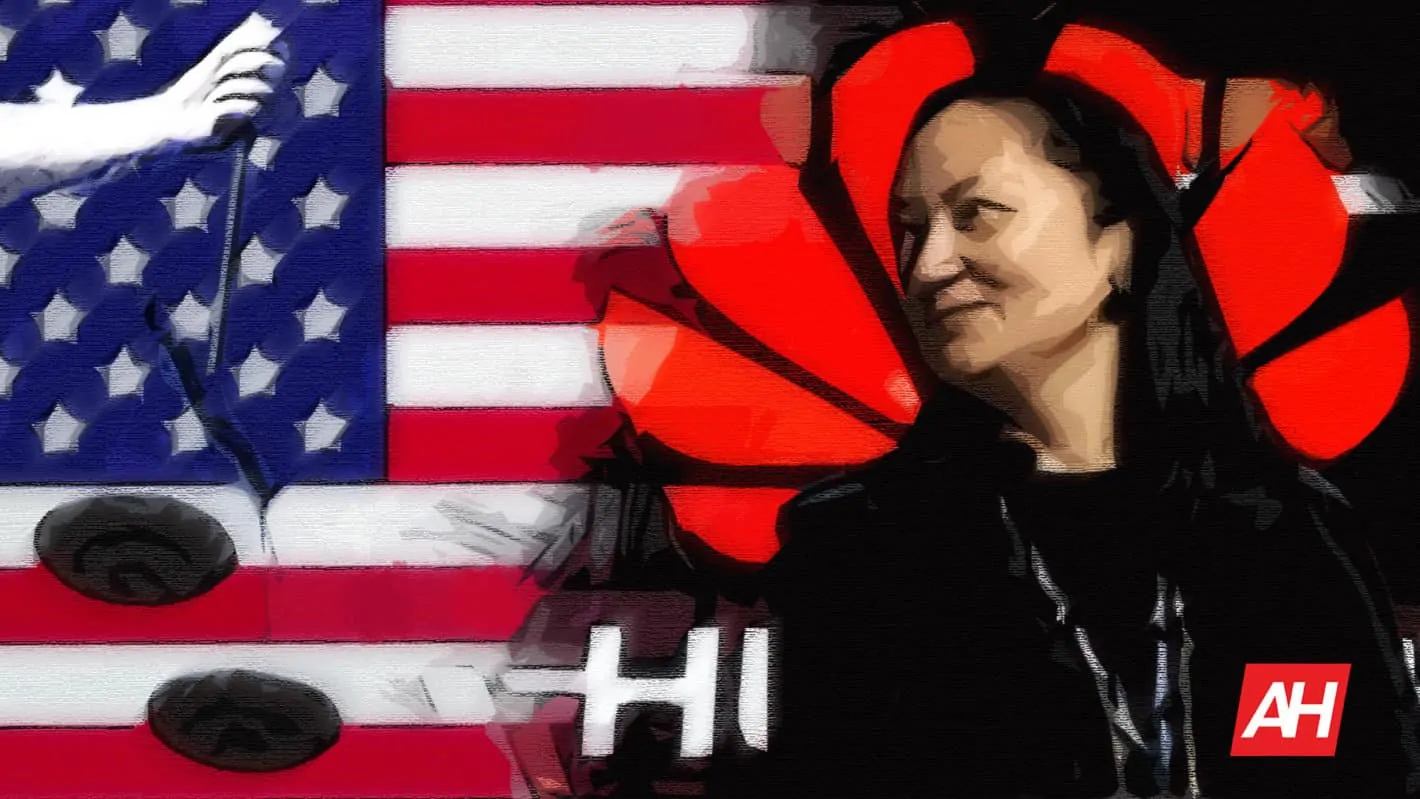Huawei Chief Financial Officer Meng Wanzhou wasn’t a particularly well-known name in the West — especially outside of tech circles — until only several months back. After being detained at a Canadian airport on her way to Mexico on December 1, she ended up at the center of a diplomatic scandal, with her name on the lips of many a statesman.
The 47-year-old daughter of Huawei founder Ren Zhengfei has been with the company since its startup days in the 90s and held a variety of positions, with the CFO role being the crown of her career that began with the China Construction Bank in ’92, immediately following her graduation. She quit that job to join Huawei as a secretary after a year, hence supporting her father’s endeavor from its inception. While still in her 20s, Ms. Meng took a hiatus and earned a master’s degree in accounting from the Huazhong University of Science and Technology in ’97, then returned to Huawei in ’98 and steadily climbed the ranks ever since.
When exactly did she earn the current CFO role is unclear; Huawei only disclosed the names of its C-suite executives in 2011 and Ms. Meng was already entrusted with that position back then. Almost exactly one year ago to date, the industry veteran and mother of four was appointed as one of the four chairpeople of Huawei’s board. Whether by work history, legacy, or family name, Ms. Meng is a top Huawei official and one of the most important individuals at the Shenzen-based technology juggernaut.
And while details of her two-decade rise to the top level of the company’s hierarchy remain scarce, recent developments shed much light on her latest role at Huawei – none of it good.
The story of how Ms. Meng ended up facing decades in prison is a spotty one, especially after she won a publication ban in Canada shortly following her early December arrest, thus limiting the media’s ability to discover and report on the details of her case. Still, here’s what’s known so far:
If it looks like a front and acts like a front…
The United States Department of Justice that’s presently trying (and succeeding, so far) to extradite Ms. Meng from Canada alleges she has personally forged and maintained secretive relationships with two former companies with Middle Eastern operations. Through those ties, the executive sought to violate the Commerce Department’s trade sanctions imposed on Iran. Whether or not she succeeded has yet to be clarified in the court of law but not only is the answer to that question a resounding “yes” if you ask Washington officials but the conspiracy to break federal regulations is by itself also a felony.
What’s more, some of the actions that kept the full extent of Huawei’s relationships with those company hidden to outside eyes required an illegal banking scheme, hence constituting fraud.
The companies in question are Hong Kong-based Skycom Tech Co Ltd that operated a Tehran affiliate, as well as Canicula Holdings Ltd from Mauritius, East Africa. The money exchanged between the duo and Huawei was depicted as regular business activity, yet American prosecutors believe the two firms operated as de facto satellites of the Chinese conglomerate. While Canicula’s involvement has yet to be officially confirmed and is mainly known due to investigative reports from Reuters, Skycom has not only been mentioned by the DOJ but was even named as one of the defendants in a 13-count federal indictment unsealed in late January, with government officials explicitly identifying it as a Huawei subsidiary.
To this date, Huawei denies an affiliate relationship with Skycom, so while the federal prosecution is proceeding with its indictment, the Chinese company is attempting to argue the very basic details of the case, which some administration officials previously described as a bizarre strategy that cannot work because virtually all relevant evidence is against it. Media reports dating back as far as 2012 clearly identify it as such and provide evidence that Ms. Meng was sitting on its board of directors.
How one of the company’s top executives and the daughter of its founder would end up in the ranks of a regular associate and pulling double duty is something Huawei never even attempted to explain.
The fraud meant to keep Huawei’s relationship with Skycom a secret started no later than 2007 when the firm organized an apparent sale of its stake in Skycom, the original basis of affiliate claims, yet controlled the firm that purchased it through a complicated web of corporate relationships which were only uncovered years later as investigators were following the money. Ms. Meng personally lied to an official of one of the company’s banking partners as part of a presentation she gave in 2013, the DOJ’s lawsuit alleges.
American banks were also on the receiving end of those lies, having cleared tens of millions of dollars worth of transactions between Huawei and Skycom’s Iranian arm while relying on that false representation of the relationship between the two. Had they knowingly processed the payments while being aware of the true nature of Huawei’s Skycom ties, those banks would be facing major fines and other penalties.
In conclusion, Ms. Meng is accused of bank fraud, wire fraud, and conspiracies to commit both.
On racism, egoism, and retaliatory death sentences
Having Donald Trump as your leader means many things for any entity, let alone the nation with the most powerful military and economy in the world, yet it doesn’t exactly guarantee sensitive handling of diplomatic issues, to say the least. After Canadian authorities arrested Ms. Meng on the DOJ’s request, reports emerged that the White House was purposefully kept in the dark regarding the operation preceding the development, with the main government concern being those activities would affect trade talks between the U.S. and China.
Why President Trump wasn’t proactively given that intelligence beforehand was illustrated what happened after the deed was done; less than two weeks following Ms. Meng’s arrest, he proudly declared he’s prepared to leverage her during the negotiations in question, assuming he finds a way to do so. That statement was a true jackpot for China – it doesn’t matter that a U.S. President can’t feasibly intervene in a court proceeding of any kind, let alone such a high-profile one, and not only would any attempt to do so be frivolous but would likely end in impeachment; the very fact Trump falsely suggested he has the ability to do so provided China with ammo that it used in mere minutes.
It was precisely that statement that led to ridiculous claims about Ms. Meng being a victim of racism and politics, and it came at the worst possible time, just as China started retaliating by arresting Canadian citizens, starting with former diplomat Michael Kovrig who was in the country doing work for the International Crisis Group, and continuing with entrepreneur Michael Spavor, the founder of a local company offering tourist trips to North Korea. Teacher Sarah McIver was also taken into custody by mid-December but was later returned to Canada.
As Mr. Kovrig is technically on leave from Global Affairs Canada, PM Justin Trudeau accused China of violating diplomatic immunity which should still apply in his case. He also had a grown-up talk with Trump in early January, whereafter the head of the U.S. confirmed Washington must respect judicial independence and not attempt meddling in the case.
Two weeks later, Robert Schellenberg, a Canadian sentenced to 15 years in a Chinese prison for drug smuggling, is surprisingly granted a retrial following his appeal. Following hasty proceedings, he’s sentenced to death in mid-January, which prompted yet another diplomatic incident.
Canada’s envoy to China, John McCallum, was fired in late January after saying he believes Ms. Meng’s legal argument against her extradition to the U.S. is “quite strong,” later adding it would be “great for Canada” if Washington lets the whole thing go.
A point of no return
Ms. Meng already failed in arguing her extradition to the U.S. would be illegal and had sued the Canadian government for the treament she received. The executive held permanent residency in Canada between 2001 and 2009, owns several multi-million-dollar homes in the area together with her family, and has been regularly visiting Vancouver for years. Some of her homes were put up as collateral for her bail amounting to the equivalent of $7.5 million. Besides local ties, her attorneys cited health issues as another reason why she can not continue being incarcerated.
The picture they painted is that of a thyroid cancer survivor who suffers from sleep apnea, severe hypertension, and needs daily access to specialized foods and drugs. As for the accusations against her, the legal team assembled in Vancouver is presently shifting the blame to Huawei China’s legal team and not the finance unit led by Ms. Meng.
What happens now is anyone’s guess but this is certainly a point of no return; China is destroying its diplomatic relationships by openly threatening Canada, Canada is on the verge of dropping Huawei’s 5G technology, Huawei risks losing who some describe as its heir apparent as the aforementioned charges could amount to up to 30 years in federal prison for Ms. Meng, Ms. Meng stands to lose what she surely perceives as everything, and the U.S. is entering uncharted territory when it comes to holding Chinese firms accountable for disrespecting stateside and international laws.
In the meantime, Huawei sued the U.S. over its claims of national security concerns which prompted it to block the majority of the firm’s business on its territory, and the next hearing in Ms. Meng’s extradition trial has been scheduled for May 8 as her lawyers made abuse claims earlier this month, meaning she’ll lose at least half a year in total while fighting the charges laid out against her.
After four months’ worth of arguments, threats, arrests, firings, lawsuits, and one death sentence, it’s scary to think that whatever follows is bound to be even uglier.

